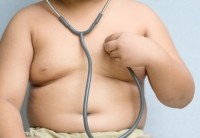A late dinner is not linked to childhood obesity, study shows

The findings contradict published research that believes circadian rhythms are impacted by meal times, which interfere with metabolic processes within the body.
This interference could lead to an increased risk of being overweight or obese.
Adult studies have shown food consumption patterns influencing energy intake. A study found that the energy consumed in the morning was negatively linked. However, the proportion consumed in the evening was positively linked with total energy intake.
Food diary approach
Researchers at King's College London used data from the UK's National Diet and Nutrition Survey Rolling Programme collected between 2008 and 2012.
Here, the food diaries of 1,620 children -- 768 children aged 4-10 years and 852 children aged 11-18 years – were used to assess dietary intake and meal timings over a four-day period.
Measurements, such as weight and height were also recorded to determine the BMI of the children.
Statistical analysis of the data found no greater risk of becoming obese or overweight if the children ate dinner between 8pm and 10pm or if they had eaten it between 2pm and 8pm.
Further analysis of the children’s dietary intake found that boys aged 4-10 who ate later were found to eat a higher proportion of protein.
Girls aged 11-18 ate a lower amount of carbohydrates as part of their daily intake when they ate later.
Dr Gerda Pot, lead author of the study and a visiting lecturer in the Diabetes and Nutritional Sciences Division found the findings ‘surprising.’
“We expected to find an association between eating later and being more likely to be overweight but actually found that this was not the case. This may be due to the limited number of children consuming their evening meal after 8pm in this cohort.”
Limited evidence does exist for adults and children. However, the new findings suggest a shortage of evidence to support expanding dietary recommendations that advise on when and what children consume.
The team highlighted a few limitations of the study, such as the under-reporting of food intake. This could be a particular problem with children, who may have difficulties conceptualising portion sizes and accurately recalling intakes.
The study tried to compensate for this by splitting the sample into two age groups to reduce complications caused by possible differences in under-reporting levels between those groups.
Child obesity

Current advice recommends an improvement in dietary quality and an increase in physical activity in order to reduce the risk of childhood obesity.
According to the World Health Organisation (WHO), estimates of the number of overweight infants and children in the WHO European Region rose steadily from 1990 to 2008.
Over 60% of children who are overweight before puberty will be overweight in early adulthood.
Childhood obesity is strongly associated with risk factors for cardiovascular disease, type 2 diabetes, orthopaedic problems, mental disorders, underachievement in school and lower self-esteem.
“Alongside changes in dietary quality and levels of physical activity, meal timing is one of many possible factors that have been suggested as influencing the trends in weight gain seen in children in the UK,” Pot added.
“We are currently also using data from this survey to look at another important aspect of children's food habits, the consumption of breakfast, to investigate the impact of eating breakfast on children's daily calorie intake and overall dietary quality. And we are conducting analyses on the impact of sleep on obesity.”
Source: British Journal of Nutrition
Published online ahead of print, DOI: 10.1017/S0007114516000635
“The timing of the evening meal: how is this associated with weight status in UK children?”
Authors: Janine Coulthard, Gerda Pot
















